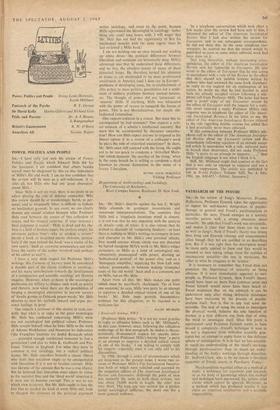Power, Politics and People Irving Louis Horowitz, Ralph Miliband Patriarch
of the Psyche R. T. Oerton Sir David Kelly Martin Gilbert and Richard Gott
Pride and Poverty Dr. A..1. Hawes,
S. Ranganalhan Britain's Guantanamo B. N. O'Brien Anarchists All Nicolas Walter POWER, POLITICS AND PEOPLE Sus,—I have only just seen the review of Power, Politics and People which Edward Shils did for the Spectator. I am confident that others besides myself must be chagrined by this en bloc indictment of Mills's life and work. I am no less confident that the review will be seen as a self-indictment. It is, after all, not Mills who had any 'great obsessions' about Shils.-•• Since Mills is not on trial, there is no point in an editor playing the role of defence counsellor. Why this review should be so unrelentingly harsh, so per- sonal, and so eloquently bitter is difficult to fathom on intellectual grounds. In any event, we can clearly dismiss any causal relation between what Professor Shils read between the covers of this collection of essays, and his visceral response. If your reviewer's final judgment is sound—'Mills is dead and his rhe- toric is a field of broken stilnes, his analysis empty, his strenuous pathos limp'--Why so strident a review? Surely a book so described merits oblivion, particu- larly if the man behind the book 'was a victim of his own vanity.' Such an extensive commentary can rein- force the vanity of the author involved (and perhaps of his editor as well!).
I have a very deep respect for Professor Shils's writings. His Torment of Secrecy must be considered a durable part of the classic tradition in sociology; and his many contributions towards the development of a comparative and scientific sociology are likewise singular. However, when so many in the sociological profession are willing to dismiss such work as poetry and rhetoric, now when there are the possibilities of forging a meaningful alternative to narrow surveys of 'dyadic groups in Oshkosh prison wards,' Mr. Shils chooses to turn his eyeballs inward and argue per- sonal feelings in print.
One expects a reviewer of this stature to state can- didly that what is at stake in the great monologue Mr. Shils has conducted concerning Mills's work arc not sociological but political values. Professor Shils reveals himself when he 'inks Mills to the work of Adorno Horkheimer and Neumann by indirection ('the Frankfurt Institute for Social Research- which . . . provided enough intellectual nonsense to last .a generation') and also to John K. Cialbraith and Pro- fessor Titmuss in England. For what they have in common is not sociology, but a radical political stance. Mr. Shils considers himself •a classic liberal who feels that socialism ought to be amalgamated with liberalism if it is not to become corrupt. Mills was likewise of the opinion that he was a true liberal. But he believed that liberalism must adjust its vision to the socialist bloc and the 'third world' situation if it were not to become corrupt. This is not to say which view is correct. But Mr. Shill ought to face the fact that lie needed the kind of work Mills did; both to sharpen the contours of the political argument
within sociology, and more to the point, because Mills represented the Meaningful in sociologSr--Sorhe- thing one could take issues with. I will wager that Mr. Shils has not had the opportunity to flex his intellectual muscles with the same vigour since he last reviewed a Mills book!
I am not holding out an olive branch nor sending up white doves-••-the political differences between liberalism and socialism are historically deep. Mills's advantage was that he understood these differences, and no less, the obsolete nature of many of these historical issues. He therefore turned his attention to issues as yet unattended to by most professional sociologists in America (and I dare say in Europe): problems of developing areas, the re-establishment of elite policy to mass politics, possibilities for a settle- ment of military problems between nuclear nations, etc. The thought of power did not 'intoxicate' or 'saturate' Mills. If anything, Mills was infatuated with the power of reason to vanquish the forces of power. This is not Manichcanism, but simple old- fashioned rationalism.
One expects criticism in a review. But must this be accompanied by bad manners? One expects a criti- cal estimate of a scholar's intellectual ancestry. But must this be accompanied by character 'assassina- tion? How can Shils expect anyone to respond to his liberal option if in a review of a colleague's work he plays the role of oratorical executioner? In short, Mr. Shils must still 'contend with the living. He ought not to be too quick to condemn a 'shrivelled Marx- ism' which demands .'the sacrifice of the living,' when in the same breath he is willing to condemn a dead kinsman to eternal damnation in the name of a frozen Liberalism, itiviNri toms nottowaz Visiting Professor Department of Anthropology and Sociology, The University of Rochester,
.. River Campus Station, Rochester 20. New York
• *






























 Previous page
Previous page